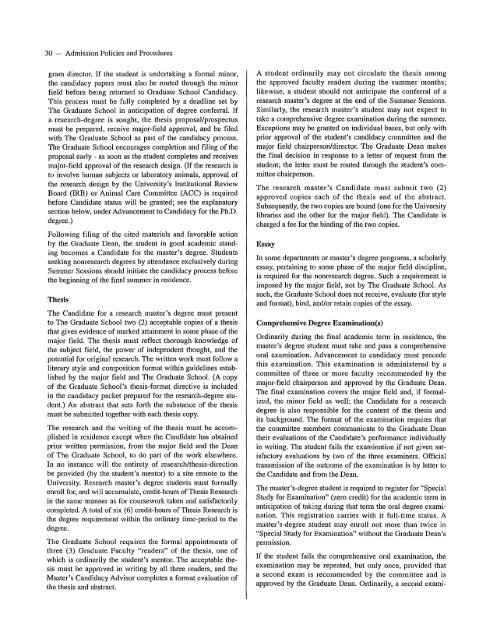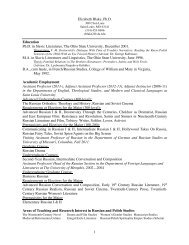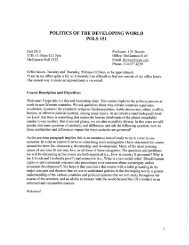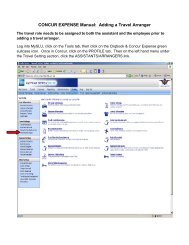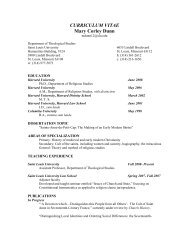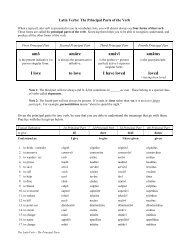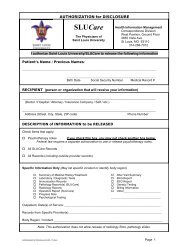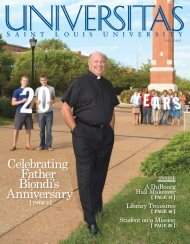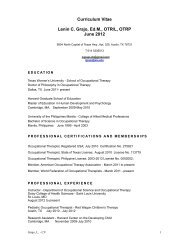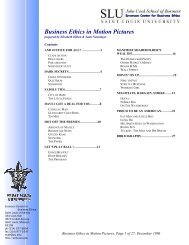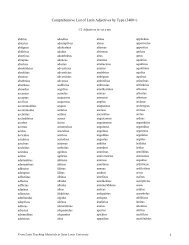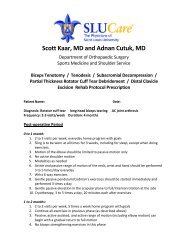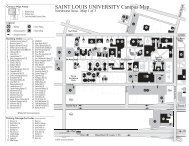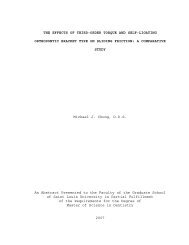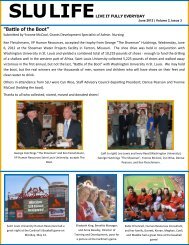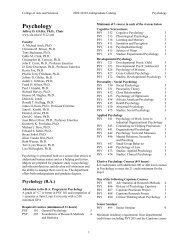Program Manual - Saint Louis University
Program Manual - Saint Louis University
Program Manual - Saint Louis University
You also want an ePaper? Increase the reach of your titles
YUMPU automatically turns print PDFs into web optimized ePapers that Google loves.
30 - Admission Policies and Procedures<br />
gram director. If the student is undertaking a formal minor,<br />
the candidacy papers must also be routed through the minor<br />
field before being returned to Graduate School Candidacy.<br />
This process must be fully completed by a deadline set by<br />
The Graduate School in anticipation of degree conferral. If<br />
a research-degree is sought, the thesis proposal/prospectus<br />
must be prepared, receive major-field approval, and be filed<br />
with The Graduate School as part of the candidacy process.<br />
The Graduate School encourages completion and filing of the<br />
proposal early - as soon as the student completes and receives<br />
major-field approval of the research design. (If the research is<br />
to involve human subjects or laboratory animals, approval of<br />
the research design by the <strong>University</strong>'S Institutional Review<br />
Board (IRB) or Animal Care Committee (ACC) is required<br />
before Candidate status will be granted; see the explanatory<br />
section below, under Advancement to Candidacy for the Ph.D.<br />
degree.)<br />
Fol1owing filing of the cited materials and favorable action<br />
by the Graduate Dean, the student in good academic standing<br />
becomes a Candidate for the master's degree. Students<br />
seeking nonresearch degrees by attendance exclusively during<br />
Summer Sessions should initiate the candidacy process before<br />
the beginning of the final summer in residence.<br />
Thesis<br />
The Candidate for a research master's degree must present<br />
to The Graduate School two (2) acceptable copies of a thesis<br />
that gives evidence of marked attainment in some phase of the<br />
major field. The thesis must reflect thorough knowledge of<br />
the subject field, the power of independent thought, and the<br />
potential for original research. The written work must follow a<br />
literary style and composition fOlmat within guidelines established<br />
by the major field and The Graduate School. (A copy<br />
of the Graduate School's thesis-format directive is included<br />
in the candidacy packet prepared for the research-degree student.)<br />
An abstract that sets forth the substance of the thesis<br />
must be submitted together with each thesis copy.<br />
The research and the writing of the thesis must be accomplished<br />
in residence except when the Candidate has obtained<br />
prior written permission, from the major field and the Dean<br />
of The Graduate School, to do part of the work elsewhere.<br />
In no instance will the entirety of research/thesis-direction<br />
be provided (by the student's mentor) to a site remote to the<br />
<strong>University</strong>. Research master's degree students must formally<br />
enroll for, and will accumulate, credit-hours of Thesis Research<br />
in the same manner as for coursework taken and satisfactorily<br />
completed. A total of six (6) credit-hours of Thesis Research is<br />
the degree requirement within the ordinary time-period to the<br />
degree.<br />
The Graduate School requires the formal appointments of<br />
three (3) Graduate Faculty "readers" of the thesis, one of<br />
which is ordinarily the student's mentor. The acceptable thesis<br />
must be approved in writing by all three readers, and the<br />
Master's Candidacy Advisor completes a format evaluation of<br />
the thesis and abstract.<br />
A student ordinarily may not circulate the thesis among<br />
the approved faculty readers during the summer months;<br />
likewise, a student should not anticipate the conferral of a<br />
research master's degree at the end of the Summer Sessions.<br />
Similarly, the research master's student may not expect to<br />
take a comprehensive degree examination during the summer.<br />
Exceptions may be granted on individual bases, but only with<br />
prior approval of the student's candidacy committee and the<br />
major field chairperson/director. The Graduate Dean makes<br />
the final decision in response to a letter of request from the<br />
student; the letter must be routed through the student's committee<br />
chairperson.<br />
The research master's Candidate must submit two (2)<br />
approved copies each of the thesis and of the abstract.<br />
Subsequently, the two copies are bound (one for the <strong>University</strong><br />
libraries and the other for the major field). The Candidate is<br />
charged a fee for the binding of the two copies.<br />
Essay<br />
In some departments or master's degree programs, a scholarly<br />
essay, pertaining to some phase of the major field discipline,<br />
is required for the nonresearch degree. Such a requirement is<br />
imposed by the major field, not by The Graduate SchooL As<br />
such, the Graduate School does not receive, evaluate (for style<br />
and format), bind, and/or retain copies of the essay.<br />
Comprehensive Degree Examination(s)<br />
Ordinarily during the final academic term in residence, the<br />
master's degree student must take and pass a comprehensive<br />
oral examination. Advancement to candidacy must precede<br />
this examination. This examination is administered by a<br />
committee of three or more faculty recommended by the<br />
major-field chairperson and approved by the Graduate Dean.<br />
The final examination covers the major field and, if formalized,<br />
the minor field as well; the Candidate for a research<br />
degree is also responsible for the content of the thesis and<br />
its background. The format of the examination requires that<br />
the committee members communicate to the Graduate Dean<br />
their evaluations of the Candidate's perfOl'mance individually<br />
in writing. The student fails the examination if not given satisfactory<br />
evaluations by two of the three examiners. Official<br />
transmission of the outcome of the examination is by letter to<br />
the Candidate and from the Dean.<br />
The master's-degree student is required to register for "Special<br />
Study for Examination" (zero credit) for the academic term in<br />
anticipation of taking during that term the oral degree examination.<br />
This registration carries with it full-time status. A<br />
master's-degree student may enroll not more than twice in<br />
"Special Study for Examination" without the Graduate Dean's<br />
permission.<br />
If the student fails the comprehensive oral examination, the<br />
examinatioll may be repeated, but only once, provided that<br />
a second exam is recommended by the committee and is<br />
approved by the Graduate Dean. Ordinarily, a second exami-


